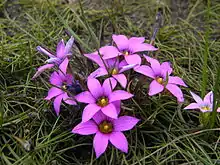Romulea rosea
Romulea rosea is a herbaceous perennial in the family Iridaceae. It is a small plant, usually less than 20 cm high, with grass-like leaves.[1] The flowers, which appear in spring, are pink with a yellow throat.[1] Common names include Guildford grass, onion grass and rosy sandcrocus.[1]
| Romulea rosea | |
|---|---|
 | |
| Scientific classification | |
| Kingdom: | Plantae |
| Clade: | Tracheophytes |
| Clade: | Angiosperms |
| Clade: | Monocots |
| Order: | Asparagales |
| Family: | Iridaceae |
| Genus: | Romulea |
| Species: | R. rosea |
| Binomial name | |
| Romulea rosea (L.) Eckl. | |
| Synonyms | |
|
Ixia rosea L. | |
R. rosea is endemic to the western Cape Province (now Western Cape, Eastern Cape and Northern Cape) in South Africa, but it has become naturalised in Europe, Australia, New Zealand, and California in the United States.[1][2] It is considered to be an environmental weed in much of Australia.[3]
References
- "Romulea rosea (L.) Eckl". Weed Alert!. The Nature Conservancy. Archived from the original on May 15, 2008. Retrieved 2008-09-10.
- "Romulea rosea". Germplasm Resources Information Network (GRIN). Agricultural Research Service (ARS), United States Department of Agriculture (USDA). Retrieved 2008-09-10.
- "Scientific Name Romulea rosea". Weeds of Australia. Queensland Government. Retrieved 2020-05-25.
This article is issued from Wikipedia. The text is licensed under Creative Commons - Attribution - Sharealike. Additional terms may apply for the media files.